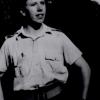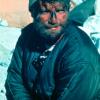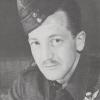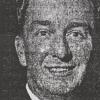Brigadier Bob Flood, who has died aged 84, won an MC in the field while serving with the 8th Battalion Parachute Regiment in Germany in 1945.
On March 31 1945, after crossing the River Ems at Greven, 3 Parachute Brigade was ordered to continue the advance and secure a bridgehead over the Dortmund-Ems Canal. Flood, then a major, was in command of "A" Company, the leading unit of 8th Parachute Battalion.
As "A" Company assaulted the bridge over the canal it blew up, and they came under heavy anti-aircraft and mortar fire. They scrambled over the girders of what remained of the bridge, but the leading platoon came under attack at point-blank range from a 20 mm flak battery and started taking casualties.
The assault was checked, and for a moment the issue hung in balance. Flood, however, took command of the platoon and led it across the canal. He established a small bridgehead and then led an attack on the battery and routed it. Flood was awarded an MC, the citation stating that his assumption of control at a critical moment turned the scale of the battle with far-reaching consequences for the whole operation.
George Robert Flood was born on November 26 1919 at Guildford, Surrey. Always known as Bob, he spent his childhood in Australia, where his father was a curate, but returned to England for his education. He went to Lancing, where he captained the cricket XI, before going on to Reading University to study Horticulture.
Flood had been a member of the OTC at school and was granted an Emergency Commission in the Royal Berkshire Regiment. He was posted to the 4th Battalion Royal Berkshires and joined "HQ" Company; his company commander was Douglas Jardine, the England cricketer.
Flood accompanied his battalion to France as part of the BEF, and commanded a platoon of bren-gun carriers in the withdrawal from Louvain, Belgium. On the Gort Line on the Franco-Belgian frontier, he was wounded while leading a brigade counter-attack. The bullet had gone through his binoculars and then through his right hand. Four days later, he recovered consciousness to find himself in a makeshift ward in a cathedral.
A nurse brought him his middle finger in a bottle and asked him if he wanted it; he could think of no use for it and declined.
When the battalion reached Dunkirk, out of an original strength of some 40 officers and 700 soldiers, one officer and 50 soldiers were left. Flood was loaded on to a ship and, after disembarking at Newhaven, was put on a train and taken to a hospital at Epsom. The hospital had been used as a mental institution and some of the patients were still in residence, including the barber, who offered to shave Flood with a cut-throat razor.
After four months convalescing, Flood rejoined his unit. The battalion was reformed after its heavy losses in France and went to Northern Ireland as part of 148 Independent Brigade Group. He was posted to Iceland to learn mountain warfare and, after parachute training, was sent as an instructor to the night fighting wing of the School of Infantry.
In 1943 Flood moved to the Airborne Forces Development Centre at Amesbury Abbey, Wiltshire, where he helped to develop weapons and equipment. Although he had failed his medical interview for a parachute unit because of his injured hand, he passed the course at Amesbury and was posted to the 8th Parachute Battalion.
Flood was given command of "A" Company, crossing the Channel with his battalion on Christmas Eve 1944. He served with them in the battles of the Ardennes and the Rhine crossing, and reached Wismar on the Baltic one day before the Russians.
After VE Day, Flood became second in command of the 1st Parachute Battalion, with which he went to Palestine. He joined 4th Parachute Battalion before attending Staff College.
Flood spent three years as brigade major of 8th Infantry Brigade before commanding a company at Sandhurst. In 1955 he was posted to the Chiefs of Staff Secretariat and then joined the 3rd Parachute Battalion in Jordan as second in command. After a spell with the British Army staff in Washington, he commanded the Army Air Transport Development Centre.
His final appointment before retiring was as Assistant Commandant of RMA Sandhurst. Flood settled in a village in Wiltshire and ran the National Garden Scheme for the county. Cricket was another passion; he had kept wicket for the Young Amateurs of Surrey before the war, and retained a great enthusiasm for the game.
Bob Flood died on October 11. He married, in 1945, Jeanette Norris, who predeceased him. He is survived by a son and a daughter.
Reproduced by kind permission of the Daily Telegraph
Read More




Latest Comments
There are currently no comments for this content.
Add Comment
In order to add comments you must be registered with ParaData.
If you are currently a ParaData member please login.
If you are not currently a ParaData member but wish to get involved please register.